wp2
CMMSE 2022
08/07/22/12:34 Filed in: Conference participation
Int Conf on Computational and Mathematical Methods in Science and Engineering, CMMSE, Rota, Cádiz, Spain, July 3-7, 2022
As in previous years, we included in CMMSE a special session entitled Mathematical Methods in Computer Science. The session was well-attended. We presented the work "Mining fuzzy concept lattices" (presentation by Domingo López-Rodríguez), "Fuzzy closure structures as fixed points of a fuzzy Galois connection" (by Emilio Muñoz et al, presented by Manuel Ojeda-Hernández) and "Using f-indexes of inclusion and contradiction for a fuzzy version of the square of oppositions" (presented by Manuel Ojeda-Aciego).
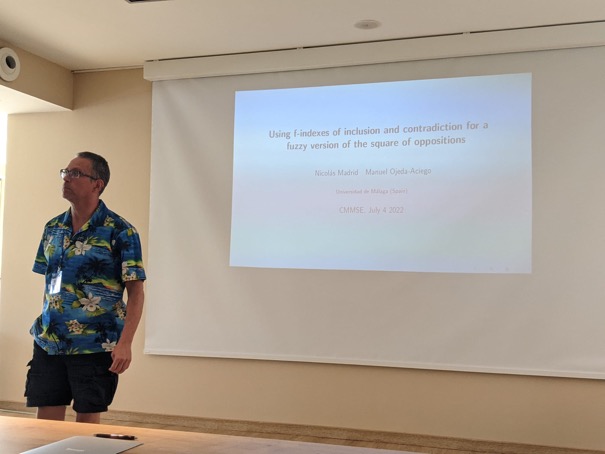
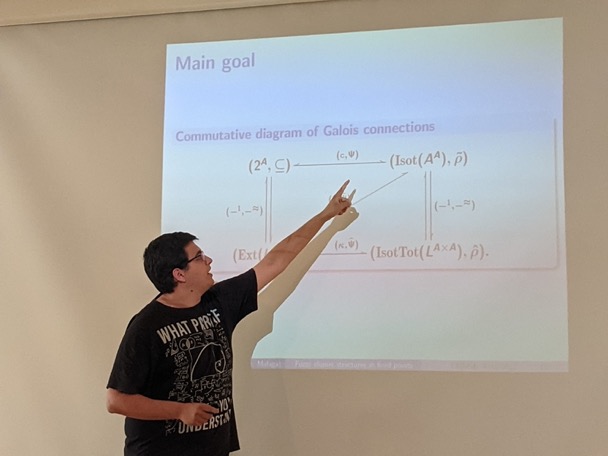
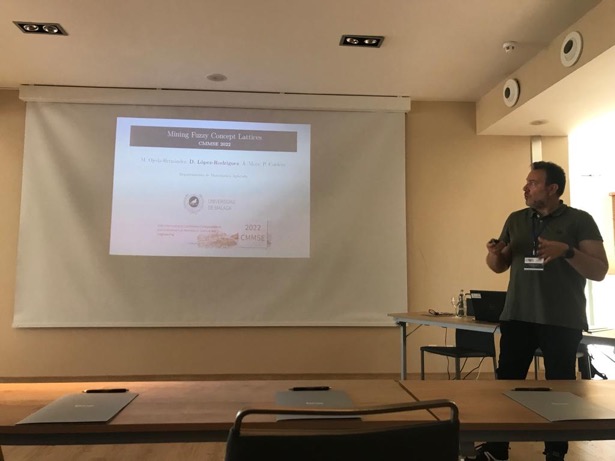
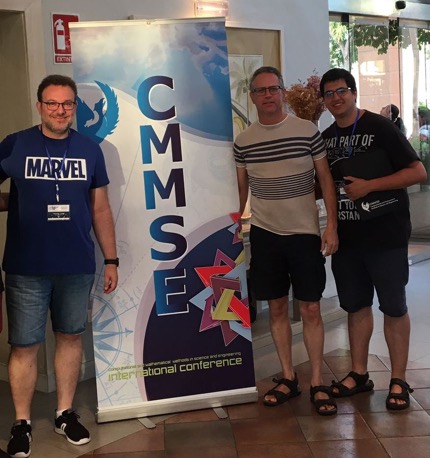
CLA 2022
24/06/22/12:34 Filed in: Conference participation
Concept Lattices and their Applications, CLA, Tallinn, Estonia, June 20-22, 2022
We presented four works "Fuzzy closure systems over Heyting algebras as fixed points of a fuzzy Galois connection" (by Emilio Muñoz and other colleagues in the department, Manuel Ojeda-Hernández presented the paper), "Revisiting Algorithms for Fuzzy Concept Lattices" (by Domingo López and other colleagues in the department), and "Partial formal contexts with degrees" and "On the affordance-theoretic bases of the landscape of knowledge paradigm" (by Manuel Ojeda-Aciego and others).
Back to the onsite format conference, with interesting invited talks by our colleagues and co-authors Peter Vojtáš and Bernard De Baets.
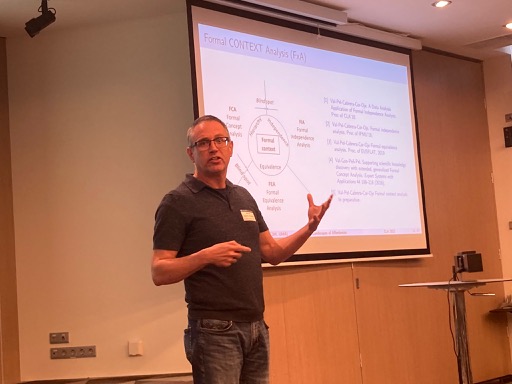
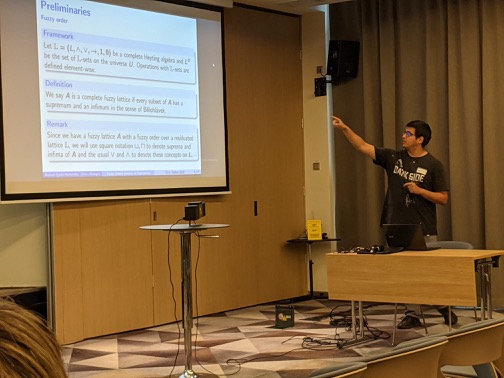
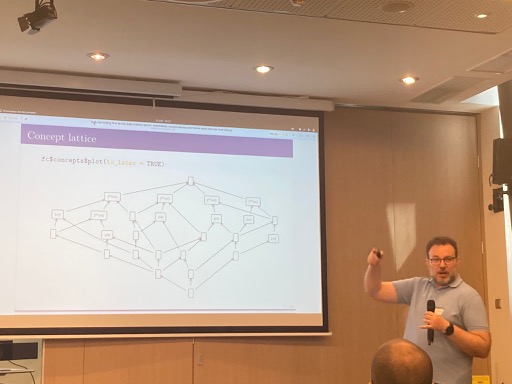
Conference paper accepted
08/07/22/12:27 Filed in: Conference paper
F.J. Valverde-Albacete, C. Peláez-Moreno, I.P. Cabrera, P. Cordero, M. Ojeda-Aciego. Can FCA Provide a Framework for Artificial General Intelligence? Workshop What can FCA do for Artificial Intelligence? (FCA4AI@IJCAI-ECAI'22), Vienna, 2022.
ABSTRACT This paper is an attempt at bridging two strains of research being developed by the authors: a theory of information flows to subserve intelligence and a theory of affordances for the modelling of Embodied, Embedded, Extended and Enacted Computational Intelligence as pro- vided by FCA. We list previous successes, present challenges, and future avenues of research that suggest themselves.
ABSTRACT This paper is an attempt at bridging two strains of research being developed by the authors: a theory of information flows to subserve intelligence and a theory of affordances for the modelling of Embodied, Embedded, Extended and Enacted Computational Intelligence as pro- vided by FCA. We list previous successes, present challenges, and future avenues of research that suggest themselves.
Journal paper accepted
30/05/22/11:27 Filed in: Journal paper
N. Madrid, C. Cornelis. Kitainik axioms do not characterize the class of inclusion measures based on contrapositive fuzzy implications. Information Sciences, 2022. To appear.
ABSTRACT In this short communication, we refute the conjecture by Fodor and Yager that the class of inclusion measures proposed by Kitainik coincides with that of inclusion measures based on contrapositive fuzzy implications. In particular, we show that the conjecture only holds when the considered universe of discourse is finite.
ABSTRACT In this short communication, we refute the conjecture by Fodor and Yager that the class of inclusion measures proposed by Kitainik coincides with that of inclusion measures based on contrapositive fuzzy implications. In particular, we show that the conjecture only holds when the considered universe of discourse is finite.
Journal papers accepted
30/05/22/10:10 Filed in: Journal papers
M. Ojeda-Hernández, I.P. Cabrera, P. Cordero and E. Muñoz-Velasco. Fuzzy Closure Relations. Fuzzy Sets and Systems, 2022. To appear
ABSTRACT The concept of closure operator is key in several branches of mathematics. In this paper, closure operators are extended to relational structures, more specifically to fuzzy relations in the framework of complete fuzzy lattices. The core of the work is the search for a suitable definition of (strong) fuzzy closure relation, that is, a fuzzy relation whose relation with fuzzy closure systems is one-to-one.The study of the properties of fuzzy closure systems and fuzzy relations helps narrow down this exploration until an appropriate definition is settled.
W. Conradie, D. Della Monica, E. Muñoz-Velasco, G. Sciavicco, I.E. Stan. Fuzzy Halpern and Shoham’s Interval Temporal Logics. Fuzzy Sets and Systems, 2022. To appear
ABSTRACT The most representative interval temporal logic, called HS, was introduced by Halpern and Shoham in the nineties. Recently, HS has been proposed as a suitable formalism for modern artificial intelligence applications; however, when dealing with real-life data one is not always able to express temporal re- lations and propositional labels in a definite, crisp way. In this paper, follow- ing the seminal ideas of Fitting and Zadeh, we present a fuzzy generalization of HS, called FHS, that partially solves such problems of expressive power. We study FHS from both a theoretical and an application standpoint: first, we discuss its syntax, semantics, expressive power, and satisfiability problem; then, we define and solve the time series FHS finite model checking problem, to serve as the basis of future applications.
ABSTRACT The concept of closure operator is key in several branches of mathematics. In this paper, closure operators are extended to relational structures, more specifically to fuzzy relations in the framework of complete fuzzy lattices. The core of the work is the search for a suitable definition of (strong) fuzzy closure relation, that is, a fuzzy relation whose relation with fuzzy closure systems is one-to-one.The study of the properties of fuzzy closure systems and fuzzy relations helps narrow down this exploration until an appropriate definition is settled.
W. Conradie, D. Della Monica, E. Muñoz-Velasco, G. Sciavicco, I.E. Stan. Fuzzy Halpern and Shoham’s Interval Temporal Logics. Fuzzy Sets and Systems, 2022. To appear
ABSTRACT The most representative interval temporal logic, called HS, was introduced by Halpern and Shoham in the nineties. Recently, HS has been proposed as a suitable formalism for modern artificial intelligence applications; however, when dealing with real-life data one is not always able to express temporal re- lations and propositional labels in a definite, crisp way. In this paper, follow- ing the seminal ideas of Fitting and Zadeh, we present a fuzzy generalization of HS, called FHS, that partially solves such problems of expressive power. We study FHS from both a theoretical and an application standpoint: first, we discuss its syntax, semantics, expressive power, and satisfiability problem; then, we define and solve the time series FHS finite model checking problem, to serve as the basis of future applications.
ESTYLF conference organized
The FLAIR group organises ESTYLF (the Spanish Conference on Fuzzy Logic and Technology) as an event of CAEPIA (Spanish conference on Artificial Intelligence), within the Spanish Conference of Informatics (CEDI) in Málaga
The new edition of the Spanish Conference on Fuzzy Logic and Technology (ESTYLF) has been organised by our group, being Manuel Ojeda-Aciego the Scientific Chair (together with Susana Montes from Univ. Oviedo).
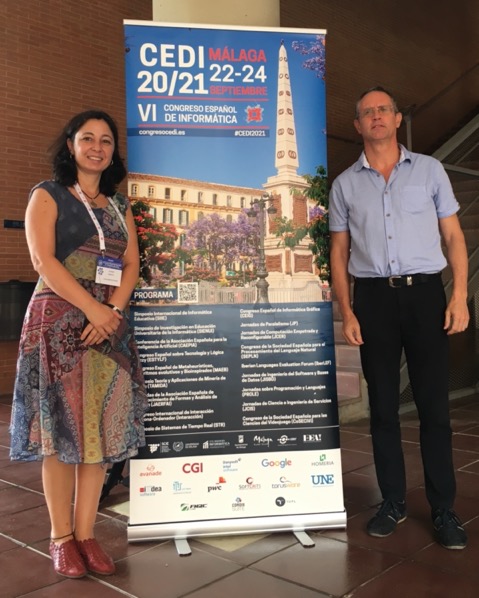
We also participate as co-editors of the proceedings of CAEPIA'21, published by Springer.
Conference paper accepted
18/06/21/13:30 Filed in: Conference paper
N. Madrid, M. Ojeda-Aciego. Measuring Consistency of Fuzzy Logic Theories. Proc. of the Spanish Conference on Fuzzy Logic and Technology, Málaga, 2021.
ABSTRACT Fuzzy logic has shown to be a suitable framework to handle contradictions in which, unsurprisingly, the notion of inconsistency can be defined in different ways. This paper starts with a short survey of different ways to define the notion of inconsistency in fuzzy logic systems. As a result, we provide a first notion of inconsistency by means of the absence of models. Subsequently, we define two measures of consistency that belong purely to the fuzzy paradigm; in the sense that both measures coincide with the crisp notion of consistency when the set of truth values is $\{0,1\}$. Accordingly, we can state that the two provided measures of consistence are notions of consistence based on degrees, bringing back the spirit of fuzzy logic into the notion of consistency.
ABSTRACT Fuzzy logic has shown to be a suitable framework to handle contradictions in which, unsurprisingly, the notion of inconsistency can be defined in different ways. This paper starts with a short survey of different ways to define the notion of inconsistency in fuzzy logic systems. As a result, we provide a first notion of inconsistency by means of the absence of models. Subsequently, we define two measures of consistency that belong purely to the fuzzy paradigm; in the sense that both measures coincide with the crisp notion of consistency when the set of truth values is $\{0,1\}$. Accordingly, we can state that the two provided measures of consistence are notions of consistence based on degrees, bringing back the spirit of fuzzy logic into the notion of consistency.
Conference papers accepted
26/05/21/10:32 Filed in: Conference paper
N. Madrid, M. Ojeda-Aciego. Approaching the square of oppositions in terms of the f-indexes of inclusion and contradiction. Proc. of the 19th World Congress of the International Fuzzy Systems Association and 12th Conference of the European Society for Fuzzy Logic and Technology, Bratislava, 2021.
ABSTRACT We continue analyzing the properties of f-inclusion and f-contradiction, and provide an alternative interpretation of the square of opposition.
M. Ojeda-Hernández, I.P. Cabrera, P. Cordero and E. Muñoz-Velasco. Closure systems as a fuzzy extension of meet-subsemilattices. Proc. of the 19th World Congress of the International Fuzzy Systems Association and 12th Conference of the European Society for Fuzzy Logic and Technology, Bratislava, 2021.
ABSTRACT An extension of the notion of closure system is introduced adapting the notion of meet-subsemilattice to a complete fuzzy lattice. Results relating closure operators and closure systems in the classical case are extended properly to this framework. Then, this definition is proved to be equivalent to the most used definition given by Belohlávek on the fuzzy powerset lattice.
ABSTRACT We continue analyzing the properties of f-inclusion and f-contradiction, and provide an alternative interpretation of the square of opposition.
M. Ojeda-Hernández, I.P. Cabrera, P. Cordero and E. Muñoz-Velasco. Closure systems as a fuzzy extension of meet-subsemilattices. Proc. of the 19th World Congress of the International Fuzzy Systems Association and 12th Conference of the European Society for Fuzzy Logic and Technology, Bratislava, 2021.
ABSTRACT An extension of the notion of closure system is introduced adapting the notion of meet-subsemilattice to a complete fuzzy lattice. Results relating closure operators and closure systems in the classical case are extended properly to this framework. Then, this definition is proved to be equivalent to the most used definition given by Belohlávek on the fuzzy powerset lattice.
Conference paper accepted
15/03/21/09:11 Filed in: Conference paper
D. López-Rodríguez, P. Cordero, M. Enciso, Á. Mora. Clustering and identification of core implications. Int Con on Formal Concept Analysis (ICFCA), Strasbourg, 2021.
ABSTRACT FCA exhaustively uses the notion of cluster, by grouping attributes and objects and also providing a strong algebraic structure to them by means of the concept lattice. Our proposal explores how we can cluster implications. This work opens a research line in the direction of studying the knowledge inside the clusters computed from the Duquenne-Guigues basis. Some alternative measures to induce the clusters are analyzed, taking into account the information that directly appears in the appearance and in the semantics of the implications. This work also allows us to show to the FCA community the fcaR package, having the main methods of FCA and of the Simplification Logic. The paper ends with a motivation of the potential applications of performing clustering on the implications.
ABSTRACT FCA exhaustively uses the notion of cluster, by grouping attributes and objects and also providing a strong algebraic structure to them by means of the concept lattice. Our proposal explores how we can cluster implications. This work opens a research line in the direction of studying the knowledge inside the clusters computed from the Duquenne-Guigues basis. Some alternative measures to induce the clusters are analyzed, taking into account the information that directly appears in the appearance and in the semantics of the implications. This work also allows us to show to the FCA community the fcaR package, having the main methods of FCA and of the Simplification Logic. The paper ends with a motivation of the potential applications of performing clustering on the implications.
Journal paper accepted
15/03/21/09:42 Filed in: Journal paper
N. Madrid and M. Ojeda-Aciego. A Measure of Consistency for Fuzzy Logic Theories. Mathematical Methods in the Applied Sciences, 2021. To appear
ABSTRACT Fuzzy logic has shown to be a suitable framework to handle contradictions in which, unsurprisingly, the notion of inconsistency can be defined in different ways. This paper starts with a short survey of different ways to define the notion of inconsistency in fuzzy logic systems. As a result, we provide a first notion of inconsistency by means of the absence of models. Subsequently, we define two measures of consistency that belong purely to the fuzzy paradigm; in the sense that both measures coincide with the crisp notion of consistency when the set of truth values is {0,1}. Accordingly, we can state that the two provided measures of consistence are notions of consistence based on degrees, bringing back the spirit of fuzzy logic into the notion of consistency.
ABSTRACT Fuzzy logic has shown to be a suitable framework to handle contradictions in which, unsurprisingly, the notion of inconsistency can be defined in different ways. This paper starts with a short survey of different ways to define the notion of inconsistency in fuzzy logic systems. As a result, we provide a first notion of inconsistency by means of the absence of models. Subsequently, we define two measures of consistency that belong purely to the fuzzy paradigm; in the sense that both measures coincide with the crisp notion of consistency when the set of truth values is {0,1}. Accordingly, we can state that the two provided measures of consistence are notions of consistence based on degrees, bringing back the spirit of fuzzy logic into the notion of consistency.
Book chapter accepted
12/01/21/09:07 Filed in: Book chapter
A. Burrieza, E. Muñoz-Velasco, M. Ojeda-Aciego. Cercanía y despreciabilidad usando lógica con órdenes de magnitud. En Lógica, Conocimiento y Abducción, (C. Barés, F.J. Salguero & F. Soler, ed.) College Publications. 2021. London.
ABSTRACT En este trabajo nos centramos en un enfoque lógico de la importante noción de cercanía, que no ha recibido mucha atención en la bibliografía. Introduciremos una noción de cercanía basada en intervalos llamados intervalos de proximidad, que se utilizarán para decidir los elementos que están cerca unos de otros. Algunas de las intuiciones de esta definición se explican sobre la base de ejemplos. Además, presentamos una noción de despreciabilidad que combinamos con la noción de cercanía. Probamos la capacidad de decisión de la lógica multimodal introducida y, a continuación, mostramos algunos aspectos de la potencia expresiva de nuestra lógica: su capacidad para denotar posiciones particulares de los intervalos de proximidad, la cantidad de intervalos que posee una clase cualitativa dada y su capacidad para definir diferentes tipos de conectivas modales sobre intervalos, sean o no de proximidad.
ABSTRACT En este trabajo nos centramos en un enfoque lógico de la importante noción de cercanía, que no ha recibido mucha atención en la bibliografía. Introduciremos una noción de cercanía basada en intervalos llamados intervalos de proximidad, que se utilizarán para decidir los elementos que están cerca unos de otros. Algunas de las intuiciones de esta definición se explican sobre la base de ejemplos. Además, presentamos una noción de despreciabilidad que combinamos con la noción de cercanía. Probamos la capacidad de decisión de la lógica multimodal introducida y, a continuación, mostramos algunos aspectos de la potencia expresiva de nuestra lógica: su capacidad para denotar posiciones particulares de los intervalos de proximidad, la cantidad de intervalos que posee una clase cualitativa dada y su capacidad para definir diferentes tipos de conectivas modales sobre intervalos, sean o no de proximidad.
CMMSE'20
02/08/20/10:14 Filed in: Conference participation | Chairing
Int Conf on Computational and Mathematical Methods in Science and Engineering, CMMSE, Rota, Cádiz, Spain, July 26-30 2020
Although the original dates were changed due to the COVID-19 outbreak, the conference was finally held at the end of july in Rota (Cádiz), Spain.
As in previous years, we included in CMMSE a special session entitled Mathematical Methods in Computer Science, in cooperation with the Royal Spanish Society of Mathematics. Obviously, the onsite attendance was not as massive as in last edition, however the session was well-attended both by the speakers (all present at the conference) and the online participants. We presented the work "Inconsistency in fuzzy logic systems".
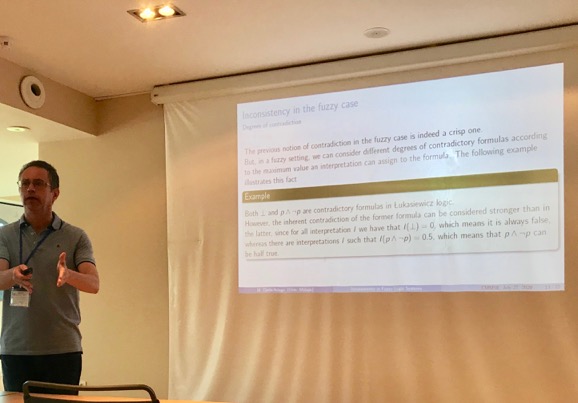
FLAIR member chairs TIME 2020
01/04/20/10:37 Filed in: Chairing
27th Int Symp on Temporal Representation and Reasoning (TIME)
Emilio Muñoz will chair the programme committee of the 27th Int Symp on Temporal Representation and Reasoning (TIME), Bolzano (Italy), 2020.
It will be part of the Bolzano Summer of Knowledge, which will also host EKAW 2020, ICBO 2020, FOIS 2020, and several other events.
Emilio Muñoz will chair the programme committee of the 27th Int Symp on Temporal Representation and Reasoning (TIME), Bolzano (Italy), 2020.
It will be part of the Bolzano Summer of Knowledge, which will also host EKAW 2020, ICBO 2020, FOIS 2020, and several other events.
Conference papers accepted
12/05/20/10:16 Filed in: Conference papers
Inma P. Cabrera, P. Cordero, E. Muñoz and M. Ojeda-Aciego. Galois connections between unbalanced structures in a fuzzy framework. 18th International Conference on Information Processing and Management of Uncertainty in Knowledge-Based Systems (IPMU), Lisboa, 2020.
ABSTRACT The construction of Galois connections between unbalanced structures has received considerable attention in the recent years.
In a nutshell, the problem is to find a right adjoint of a mapping defined between sets with unbalanced structure; in this paper we survey recent results obtained in this framework, focusing specially on the fuzzy structures that have been considered so far in this context: fuzzy preposets, fuzzy preordered structures, and fuzzy T-digraphs.
F. Valverde, C. Peláez, I.P. Cabrera, P. Cordero, and M. Ojeda-Aciego. Exploratory Data Analysis of Multi-label Classification Tasks with Formal Context Analysis. Concept Lattices and their Applications (CLA), Tallinn, 2020.
ABSTRACT We introduce a new framework, Formal Context Analysis (FxA), for the exploratory analysis of data tasks cast in the guise of formal contexts. FxA gathers a number of results from Formal Concpt Analysis, Formal Independence Analysis and Formal Equivalence Analysis to enhance the establishment and processing of hypothesis about data. We apply this framework to the study of the Multi-label Classification (MLC) task and obtain a number of results of technical nature about how the induction mechanism for MLC classifiers should proceed. The application is based on an analysis of multilabel classification from the standpoint of FxA.
N. Madrid and M. Ojeda-Aciego. Inconsistency in fuzzy logic systems. International Conference on Computational and Mathematical Methods in Science and Engineering (CMMSE), Rota, 2020.
ABSTRACT Different notions of consistency which are equivalent in the classical case are no longer equivalent in a fuzzy framework; this leads to different potential notions of consistency in a fuzzy setting. The underlying problem is to consider "consistency" as a crisp property; instead, we propose to consider a gradual notion of consistency, and different measures of consistency are introduced and analyzed.
N. Madrid. Towards the use of quantile fuzzy transforms for the construction of fuzzy association rules. IEEE Int Conf on Fuzzy Systems (FUZZ-IEEE), Glasgow, 2020.
ABSTRACT This paper analyzes the possibility of defining fuzzy association rules by means of direct quantiles F-transforms. The set of fuzzy association rules is used in a fuzzy inference system, defined by means of the inverse quantile F-transform. The obtained inference system reminds the Takagi-Sugeno one due to the use of a weighted sum to perform the inference. However, there is an important difference: the output is a fuzzy set and, as a result, we require the use of a defuzzification procedure. In addition, in this paper we prove experimentally that the fuzzy set obtained as the output of the proposed inference system is related to a probability distribution.
N. Madrid and E. Ramírez-Poussa. Representative Set of Objects in Rough Sets Based on Galois Connections. International Joint Conference on Rough Sets (IJCRS), La Habana, 2020.
ABSTRACT This paper introduces a novel definition, called representative set of objects of a decision class, in the framework of decision systems based on rough sets. The idea behind such a notion is to consider subsets of objects that characterize the different classes given by a decision system. Besides the formal definition of representative set of objects of a decision class, we present different mathematical properties of such sets and a relationship with classification tasks based on rough sets.
ABSTRACT The construction of Galois connections between unbalanced structures has received considerable attention in the recent years.
In a nutshell, the problem is to find a right adjoint of a mapping defined between sets with unbalanced structure; in this paper we survey recent results obtained in this framework, focusing specially on the fuzzy structures that have been considered so far in this context: fuzzy preposets, fuzzy preordered structures, and fuzzy T-digraphs.
F. Valverde, C. Peláez, I.P. Cabrera, P. Cordero, and M. Ojeda-Aciego. Exploratory Data Analysis of Multi-label Classification Tasks with Formal Context Analysis. Concept Lattices and their Applications (CLA), Tallinn, 2020.
ABSTRACT We introduce a new framework, Formal Context Analysis (FxA), for the exploratory analysis of data tasks cast in the guise of formal contexts. FxA gathers a number of results from Formal Concpt Analysis, Formal Independence Analysis and Formal Equivalence Analysis to enhance the establishment and processing of hypothesis about data. We apply this framework to the study of the Multi-label Classification (MLC) task and obtain a number of results of technical nature about how the induction mechanism for MLC classifiers should proceed. The application is based on an analysis of multilabel classification from the standpoint of FxA.
N. Madrid and M. Ojeda-Aciego. Inconsistency in fuzzy logic systems. International Conference on Computational and Mathematical Methods in Science and Engineering (CMMSE), Rota, 2020.
ABSTRACT Different notions of consistency which are equivalent in the classical case are no longer equivalent in a fuzzy framework; this leads to different potential notions of consistency in a fuzzy setting. The underlying problem is to consider "consistency" as a crisp property; instead, we propose to consider a gradual notion of consistency, and different measures of consistency are introduced and analyzed.
N. Madrid. Towards the use of quantile fuzzy transforms for the construction of fuzzy association rules. IEEE Int Conf on Fuzzy Systems (FUZZ-IEEE), Glasgow, 2020.
ABSTRACT This paper analyzes the possibility of defining fuzzy association rules by means of direct quantiles F-transforms. The set of fuzzy association rules is used in a fuzzy inference system, defined by means of the inverse quantile F-transform. The obtained inference system reminds the Takagi-Sugeno one due to the use of a weighted sum to perform the inference. However, there is an important difference: the output is a fuzzy set and, as a result, we require the use of a defuzzification procedure. In addition, in this paper we prove experimentally that the fuzzy set obtained as the output of the proposed inference system is related to a probability distribution.
N. Madrid and E. Ramírez-Poussa. Representative Set of Objects in Rough Sets Based on Galois Connections. International Joint Conference on Rough Sets (IJCRS), La Habana, 2020.
ABSTRACT This paper introduces a novel definition, called representative set of objects of a decision class, in the framework of decision systems based on rough sets. The idea behind such a notion is to consider subsets of objects that characterize the different classes given by a decision system. Besides the formal definition of representative set of objects of a decision class, we present different mathematical properties of such sets and a relationship with classification tasks based on rough sets.
Journal paper accepted
13/03/20/10:32 Filed in: Journal paper
N. Madrid, M. Ojeda. On contradiction and inclusion using functional degrees. International Journal of Computational Intelligence Systems 13(1):464-471, 2020.
ABSTRACT The notion of inclusion is a cornerstone in set theory and therefore, its generalization in fuzzy set theory is of great interest. The degree of f-inclusion is one generalization of such a notion that differs from others existing in the literature because the degree of inclusion is considered as a mapping instead of a value in the unit interval. On the other hand, the degree of f-weak-contradiction was introduced to represent the contradiction between two fuzzy sets via a mapping and its definition has many similarities with the f-degree of inclusion. This suggests the existence of relations between both f-degrees. Specifically, following this line, we analyse the relationship between the f-degree of inclusion and the f-degree of contradiction via the complement of fuzzy sets and Galois connections.
ABSTRACT The notion of inclusion is a cornerstone in set theory and therefore, its generalization in fuzzy set theory is of great interest. The degree of f-inclusion is one generalization of such a notion that differs from others existing in the literature because the degree of inclusion is considered as a mapping instead of a value in the unit interval. On the other hand, the degree of f-weak-contradiction was introduced to represent the contradiction between two fuzzy sets via a mapping and its definition has many similarities with the f-degree of inclusion. This suggests the existence of relations between both f-degrees. Specifically, following this line, we analyse the relationship between the f-degree of inclusion and the f-degree of contradiction via the complement of fuzzy sets and Galois connections.
Conference papers accepted
15/01/20/08:51 Filed in: Conference papers
N. Madrid and M. Ojeda-Aciego. New measures of inclusion between fuzzy sets in terms of the f-index of inclusion. 24th Eur Conf on Artificial Intelligence (ECAI), Santiago de Compostela, 2020.
ABSTRACT The notion of inclusion is one of the most basic relations between sets, however, there is not a consensus about how to extend such a notion in fuzzy set theory. We introduce an alternative approach to previous methods in the literature in which we make use of the so-called f-index of inclusion. This approach has a main difference with respect to previous ones: instead of a value in [0,1], the measure of inclusion is identified with a function.
In this paper, using the f-index of inclusion we define two measures of inclusion in the standard sense, i.e., taking a value in [0,1] and then, we show that both measures are in accordance with the standard axiomatic approaches about measures of inclusion in the literature.
W. Conradie, D. Della Monica, E, Muñoz-Velasco and G. Sciavicco. An Approach to Fuzzy Modal Logic of Time Intervals. 24th Eur Conf on Artificial Intelligence (ECAI), Santiago de Compostela, 2020.
ABSTRACT Temporal reasoning based on intervals is nowadays ubiquitous in artificial intelligence, and the most representative interval temporal logic, called HS, was introduced by Halpern and Shoham in the eighties. There has been a great effort in the past in studying the expressive power and computational properties of the satisfiability problem for HS and its fragments, but only recently HS has been proposed as a suitable formalism for artificial intelligence applications. Such applications highlighted some of the intrinsic limits of HS: sometimes, when dealing with real-life data, many times one is not able to express temporal relations and propositional labels in a definite, crisp way. In this paper, following the seminal ideas of Fitting and Zadeh, among others, we present a fuzzy generalization of HS that partially solves such problems of expressive power, and we prove that, as in the crisp case, its satisfiability problem is generally undecidable.
ABSTRACT The notion of inclusion is one of the most basic relations between sets, however, there is not a consensus about how to extend such a notion in fuzzy set theory. We introduce an alternative approach to previous methods in the literature in which we make use of the so-called f-index of inclusion. This approach has a main difference with respect to previous ones: instead of a value in [0,1], the measure of inclusion is identified with a function.
In this paper, using the f-index of inclusion we define two measures of inclusion in the standard sense, i.e., taking a value in [0,1] and then, we show that both measures are in accordance with the standard axiomatic approaches about measures of inclusion in the literature.
W. Conradie, D. Della Monica, E, Muñoz-Velasco and G. Sciavicco. An Approach to Fuzzy Modal Logic of Time Intervals. 24th Eur Conf on Artificial Intelligence (ECAI), Santiago de Compostela, 2020.
ABSTRACT Temporal reasoning based on intervals is nowadays ubiquitous in artificial intelligence, and the most representative interval temporal logic, called HS, was introduced by Halpern and Shoham in the eighties. There has been a great effort in the past in studying the expressive power and computational properties of the satisfiability problem for HS and its fragments, but only recently HS has been proposed as a suitable formalism for artificial intelligence applications. Such applications highlighted some of the intrinsic limits of HS: sometimes, when dealing with real-life data, many times one is not able to express temporal relations and propositional labels in a definite, crisp way. In this paper, following the seminal ideas of Fitting and Zadeh, among others, we present a fuzzy generalization of HS that partially solves such problems of expressive power, and we prove that, as in the crisp case, its satisfiability problem is generally undecidable.
Spain UseRs Annual Meeting
27/11/19/08:41 Filed in: Workshop participation
XI Jornadas de Usuarios de R de España
Last November, 14-16, we presented a communication on the development of a package aimed at the application of Formal Concept Analysis, implemented in the R programming language. The title of the communication was fcaR: An R Package for using Simplification Logic with FCA and was presented by Domingo López-Rodríguez and Ángel Mora, within a session focused on the application of data analysis tools to healthcare and biology.
The package was designed to manage formal contexts and extract implications from a given dataset, and to provide tools to visualize the extracted knowledge. Furthermore, the package provides an efficient implementation of the Simplification Logic for crisp and fuzzy contexts, which allows to remove redundancies within implications very easily. Thanks to these functionalities, the package can be used to compute attribute set closures and can be used as the formal core to recommender systems.
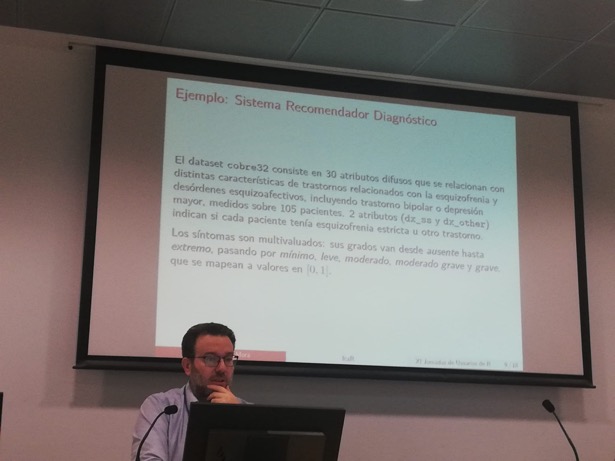
As an application, the package was used to build a recommender system in hardly 3 lines of code, to help in the differential diagnosis of schizophrenia with respect to other schizoaffective disorders.
In addition, this package has been designed to integrate with arules, the reference package of association rules in the R programming language, making it very usable by the R community researching and investigating on association rule mining and knowledge discovery.
Journal paper accepted
28/11/19/13:33 Filed in: Journal paper
N. Madrid and M. Ojeda-Aciego. Multi-adjoint lattices from adjoint triples with involutive negation. Fuzzy Sets and Systems 405:88-105, 2021.
ABSTRACT We focus primarily on the use of involutive negations in adjoint triples and the satisfiability of the contraposition law. Instead of considering natural negations, such as n(x)=x -> 0, we consider an arbitrary involutive negation and an arbitrary adjoint triple. Then, we construct a multiadjoint lattice (an algebraic structure with several conjunctions and implications) with the help of two new adjoint triples defined from the original one and the involutive negation considered. Finally, we present several results that relate the different implications and conjunctions appearing in the mentioned multi-adjoint lattice in terms of the logical laws of contraposition, interchange and exportation.
ABSTRACT We focus primarily on the use of involutive negations in adjoint triples and the satisfiability of the contraposition law. Instead of considering natural negations, such as n(x)=x -> 0, we consider an arbitrary involutive negation and an arbitrary adjoint triple. Then, we construct a multiadjoint lattice (an algebraic structure with several conjunctions and implications) with the help of two new adjoint triples defined from the original one and the involutive negation considered. Finally, we present several results that relate the different implications and conjunctions appearing in the mentioned multi-adjoint lattice in terms of the logical laws of contraposition, interchange and exportation.
HARMONIC'19
12/11/19/13:00 Filed in: Workshop participation
Herramientas Difusas Para el Razonamiento No Canónico, HARMONIC'19
We have had a nice extended week-end in Grazalema where the workshop HARMONIC'19 has been held. We had a number of interesting discussions on preliminary ideas for future work and prospects for new collaborations.
We participated with two contributions: the first one was done by Domingo López, who presented the recent R package developed for dealing with fuzzy implications "fcaR, an R package to handle fuzzy implications: design of a recommendation system for medical diagnosis"; the second contribution was a joint paper together with our colleagues Fran Valverde and Carmen Peláez from Univ. Carlos III Madrid entitled "On FXA for data analysis".
TIME'19
04/11/19/10:58 Filed in: Organizing
The FLAIR group organises the conference TIME 2019 in Málaga
The 26th edition of the International Symposium on Temporal Representation and Reasoning has been organised by our group, being Emilio Muñoz-Velasco the Local Chair.
This conference is considered a TOP one in its topic (see Guide2Research) and is indexed as CORE B. The keynote speakers were Michael Böhlen, Estela Saquete Boró and Patricia Bouyer.
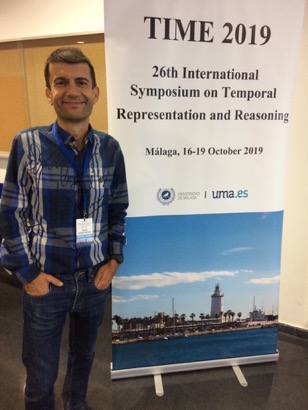
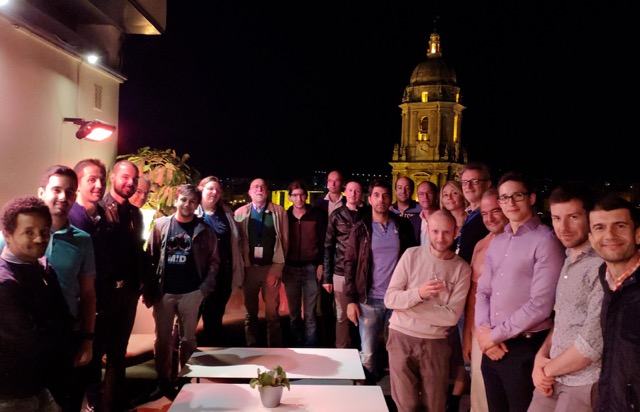
We participated with the paper "Simplifying Inductive Schemes in Temporal Logic" co-authored by Inma Fortes et al.
Conference paper accepted
02/09/19/11:38 Filed in: Conference papers
P. Cordero, I. Fortes, I.P. de Guzmán and S. Sánchez. Simplifying Inductive Schemes in Temporal Logic. 26th Int Symp on Temporal Representation and Reasoning (TIME), Málaga, 2019.
ABSTRACT In propositional temporal logic, the combination of the connectives “tomorrow” and “always in the future” requires the use of induction tools. In this paper, we present a classification of inductive schemes for propositional linear temporal logic that allows the detection of loops in decision procedures. In the design of automatic theorem provers, these schemes are responsible for the searching of efficient solutions for the detection and management of loops. We study which of these schemes have a good behavior in order to give a set of reduction rules that allow us to compute these schemes efficiently and, therefore, be able to eliminate these loops. These reduction laws can be applied previously and during the execution of any automatic theorem prover. All the reductions introduced in this paper can be considered a part of the process for obtaining a normal form of a given formula.
ABSTRACT In propositional temporal logic, the combination of the connectives “tomorrow” and “always in the future” requires the use of induction tools. In this paper, we present a classification of inductive schemes for propositional linear temporal logic that allows the detection of loops in decision procedures. In the design of automatic theorem provers, these schemes are responsible for the searching of efficient solutions for the detection and management of loops. We study which of these schemes have a good behavior in order to give a set of reduction rules that allow us to compute these schemes efficiently and, therefore, be able to eliminate these loops. These reduction laws can be applied previously and during the execution of any automatic theorem prover. All the reductions introduced in this paper can be considered a part of the process for obtaining a normal form of a given formula.
Conference papers accepted
09/07/19/09:10 Filed in: Conference papers
European Symposium on Computational Intelligence and Mathematics (ESCIM), Toledo, 2019.
- N. Madrid and M. Ojeda-Aciego. Some relationships between the notions of f-inclusion and f-contradiction.
ABSTRACT In this paper we analyse the relationships between the notions of f-inclusion and f-weak-contradiction. In particular, we present some theoretical results that relate both notions by means of negation operators (used to define complements of fuzzy sets) and Galois connections - O. Krídlo, M. Ojeda-Aciego, T. Put, and M. Reformat. On some categories underlying knowledge graphs.
ABSTRACT This paper proposes a method to provide a categorical structure for RDF-based data representing descriptions of entities. This is the first step towards our aim to further develop the underlying categorical structure so that we can eventually provide an internal logic which enables us to focus on analysis of properties of entities. - P. Cordero, M. Enciso, A. Mora, M. Ojeda-Aciego, and C. Rossi. Interactive search by means of the minimal generators.
ABSTRACT If-then rules are frequently used as basic elements for knowledge representation in several areas. In Formal Concept Analysis, these rules are the so-called implications and can be used to find minimal generators in a symbolic way by using logic. The computation of all minimal generators is exponential. Here, we provide a novel lazy algorithm with polynomial delay in which minimal generators are used as forks in a map to guide an interactive search..
Journal paper accepted
12/11/19/13:33 Filed in: Journal paper
A. Burrieza, E. Muñoz-Velasco and M. Ojeda-Aciego. A flexible logic-based approach to closeness using order of magnitude qualitative reasoning. Logic Journal of the IGPL 28(1):121-133, 2020.
ABSTRACT In this paper, we focus on a logical approach to the important notion of closeness, which has not received much attention in the literature. Our notion of closeness is based on the so-called proximity intervals, which will be used to decide the elements that are close to each other. Some of the intuitions of this definition are explained on the basis of examples. We prove the decidability of the recently introduced multimodal logic for closeness and, then, we show some capabilities of the logic with respect to expressivity in order to denote particular positions of the proximity intervals.
ABSTRACT In this paper, we focus on a logical approach to the important notion of closeness, which has not received much attention in the literature. Our notion of closeness is based on the so-called proximity intervals, which will be used to decide the elements that are close to each other. Some of the intuitions of this definition are explained on the basis of examples. We prove the decidability of the recently introduced multimodal logic for closeness and, then, we show some capabilities of the logic with respect to expressivity in order to denote particular positions of the proximity intervals.
